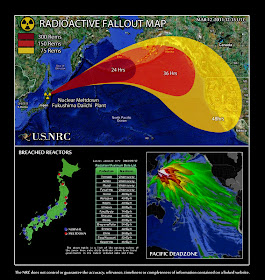More nuclear power maps from the internet!
I do love graphics.
Lets start with nuclear power station maps.
Japan Nuclear Power Facility Maps
BWR: Boiling Water Reactor
PWR: Pressurised Water Reactor
Nuclear Facility Map and Associated Radii
The three circles from small to large,
20km, 50km, 100km radii.
I included functioning nuclear reactors and the two fast breeder reactor sites.
The radii do not represent where the radiation will land though,
so as much as I want to live far from the nuclear power plants,
it's important to understand how the radioactive particles will travel.
Tricky stuff!
More reason to study up on your local climate.
Ultimately, it seems like there are very few places you can go,
to be safe-ish from potential radiation pollution.
USA version
Nuclear power plants in the US with a 100 mile radius.
Originally from the Department of Atmospheric and Climate Research,
the Norwegian Institute for Air Research (NILU).
I believe they have removed the map and replaced it with the following explanation,
We have discontinued our Flexpart forecast of the atmospheric dispersal of radionucleides from Fukushima. This due to the fact that we do not have access to reliable release rates reflecting the current situation at the plant to be used as input to our simulations. It is likely that the release of radioactive material is significantly reduced compared to the initial period, and that levels no longer pose a health risk at distance from the plant.
Its a cool looking map but I couldn't find the original source,
and a quick search on the internet lead me to numerous sites claiming
this was not made by any official organisation like the NRC or
ARS (other versions include an ARS logo).
The popular label is "Hoax map."
For a lazy information consumer like me,
its tricky not to be enticed by glossy official-looking information like this.
Especially since the map confirms my own ideas about what has happened,
making me less critical of the information I'm receiving.
In psychology we call this "confirmation bias."
Sometimes I am able to keep myself in check,
and luckily,
I have others making sure I don't mislead myself too far.
My perennial big questions is
who can we trust for reliable and accurate information,
particularly for politically and emotionally charged issues like nuclear fallout?





No comments:
Post a Comment